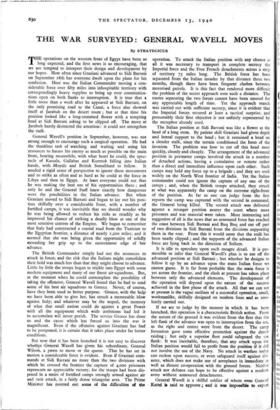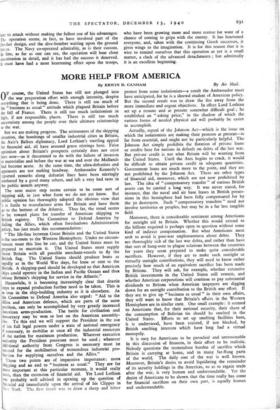THE WAR SURVEYED: GENERAL WAVELL MOVES
By STRATEGICUS
THE operations on the western front of Egypt have been so long expected, and the first news is so encouraging, that we are tempted to interpret their design and development by our hopes. How often since Graziani advanced to Sidi Barrani on September i8th has everyone dwelt upon the plans for his confusion. Here was the Italian Commander moving a con- siderable force over fifty miles into inhospitable territory with correspondingly heavy supplies to bring up over communica- tions open on both flanks to interruption. It is true that a little more than a week after he appeared at Sidi Barrani, on the only promising road to the Canal, a force also showed itself at Jarabub on the desert route ; but at that time his position looked like a long-stemmed flower with a tempting head at Sidi Barrani asking to be clipped off. The move at Jarabub barely distracted the attention: it could not strengthen the stalk.
General Wavell's position in September, however, was not strong enough to encourage such a surgical operation. He had the tharildess task of watching and waiting and using his resources to harass his enemy as much as possible on the main front, bearing meanwhile, with what heart he could, the spec- tacle of Kassala, Gallabat and Kurmuk falling into Italian hands, with Moyale and British Somaliland to follow. It needed a rigid sense of perspective to ignore these movements and to strike as often and as hard as he could at the force in Libya and then in Egypt. At least everyone could see that he was making the best use of his opportunities there ; and only he and the General Staff knew exactly how dangerous were the possibilities in the Italian advance. But when Graziani moved to Sidi Barrani and began to lay out his posi- tion skilfully over a considerable front, with a number of fortified camps, it was inevitable that we should wonder why he was being allowed to reduce his risks as steadily as he improved his chance of striking a deadly blow at one of the most sensitive centres of the Empire. We began to remember that Italy had constructed a coastal road from the Tunisian to the Egyptian frontier, a distance of nearly 1,200 miles; and it seemed that she was being given the opportunity of solidly extending her grip up to the easternmost edge of her advance.
The British Commander simply had not the resources to attack in force; and the risk that the Italians might consolidate their hold was much less than that they might choose to advance. Little by little the troops began to trickle into Egypt with some modern equipment and many of our finest air-squadrons. But, at the moment when he could contemplate the possibility of taking the offensive, General Wavell found that he had to send some of his best air squadrons to Greece. Never, of course, have they been used to better -purpose. - Greece, with the help' we have been able to give her, has struck a memorable blow against Italy; and whatever may be the sequel, the memory of what that small nation could do against a great Power with all the equipment which wide ambitions had led it to accumulate will never perish. The service Greece has done us and the cause which has forced us into the war is magnificent. Even if the offensive against Graziani has had to be postponed, it is certain that it takes place under far better conditions.
But now that it has been launched it is not easy to discover whether .General Wavell has given his subordinate, General Wilson, a pawn to move or the queen. That he has set in motion a considerable force is evident. Even if Graziani com- mands at Sidi Barrani no more than the two divisions with which he crossed the frontier the capture of 4,000 prisoners represents an appreciable victory; for the troops had been dis- posed in a series of fortified camps strongly armed against air and tank attack, in a fairly dense triangular area. The Prime Minister has pointed out some of the difficulties of the operation. To attack the Italian position with any chance at all it was necessary to transport in complete secrecy the Imperial force and the Free French detachments across a strip of territory 75 miles long. The British force has been separated from the Italian invader by that distance these two months, though there have been frequent clashes between motorised patrols. It is this fact that rendered more difficult the problem of the secret approach over such a distance. The routes separating the two forces cannot have been unused for any appreciable length of time. Yet the approach march was carried out with sufficient secrecy, since it is evident that the Imperial forces secured at least a tactical surprise, and presumably their first objective is not unfairly represented by the metaphor already used.
The Italian position at Sidi Barrani was like a flower at the head of a long stem. By patient skill Graziani had given depth and lateral support to the head ; but it remained a head on a slender stalk, since the terrain conditioned the form of the invasion. The problem was how to cut off this head most quickly, cleanly and cheaply. The arrangement of the advanced position in perimeter camps involved the attack in a number of detached actions, having a cumulative or remote rather than a direct and immediate influence upon each other. Such camps may hold any force up to a brigade ; and they are used widely on the North West frontier of India. Yet the Italian commander could not ignore the capture of any one of the camps ; and, when the British troops attacked, they struck at what was apparently the camp on the extreme right-front of the position. As far as one can judge from the first reports the camp was captured with the second in command, the General being killed. The second attack was delivered against a stronger position nearer the coast where more prisoners and war material were taken. Most interesting and suggestive of all is the news that an armoured force has reached the coast between Sidi Barrani and Buq Buq and cut off part of two divisions in Sidi Barrani from the divisions supporting them in the rear. From this it would seem that the stalk has been neatly clipped ; and the supports of the advanced Italian force are lying back in the direction of Sollum.
It is idle to speculate upon such meagre detail. It is per- missible to infer that General Wavell's plan is to cut off the advanced position at Sidi Barrani ; but whether he designs to follow it up by an advance upon the main Italian force we cannot guess. It is far from probable that the main force is yet across the frontier, and the clash at present has taken place between only the advanced elements. The development of the operation will depend upon the nature of the success achieved in the first phase of the attack. All that we can see at present is the vague outlines of a successful operation, small, workmanlike, skilfully designed on modern lines and as reso- lutely carried out.
If we are to judge by the manner in which it has been launched, this operation is a characteristic British action. From the nature of the ground it was evident from the first that the left flank of the advance was open to interruption from the sea, as the right and centre were from the desert. The camp formation gave some effective protection' against the desert raiding ; but only a superior fleet could safeguard the sea flank: It was inevitable, therefore, that any attack upon the Italian position would fail to profit from the position if it did not involve the use of the Navy. No attack in warfare today' can reckon upon success, or even safeguard itself against dis- aster, which does not make use of aeroplanes in immediate as well as distant co-operation with the ground forces. Neither attack nor defence can hope to be effective against a modern army without armoured detachments.
General Wavell is a skilful soldier of whom even General Keitel is said to approve ; and it was Impossible to expea him to attack without making the fullest use of his advantages. Tht operation seems, in fact, to have involved part of the Douhet design, and the dive-bomber waiting upon the ground forces. The Navy co-operated admirably, as is their custom. In fine, as far as one can see, the operation will bear close examination in detail, and it has had the success it deserved. It must have had a most heartening effect upon the troops, who have been growing more and more restive for want of a chance of coming to grips with the enemy. It has heartened everyone, and, taken with the continuing Greek successes, it gives wings to the imagination. It is for this reason that it is wise to remind ourselves that this operation as yet is a small matter, a clash of the advanced detachments ; but admittedly it is an excellent beginning.











































 Previous page
Previous page